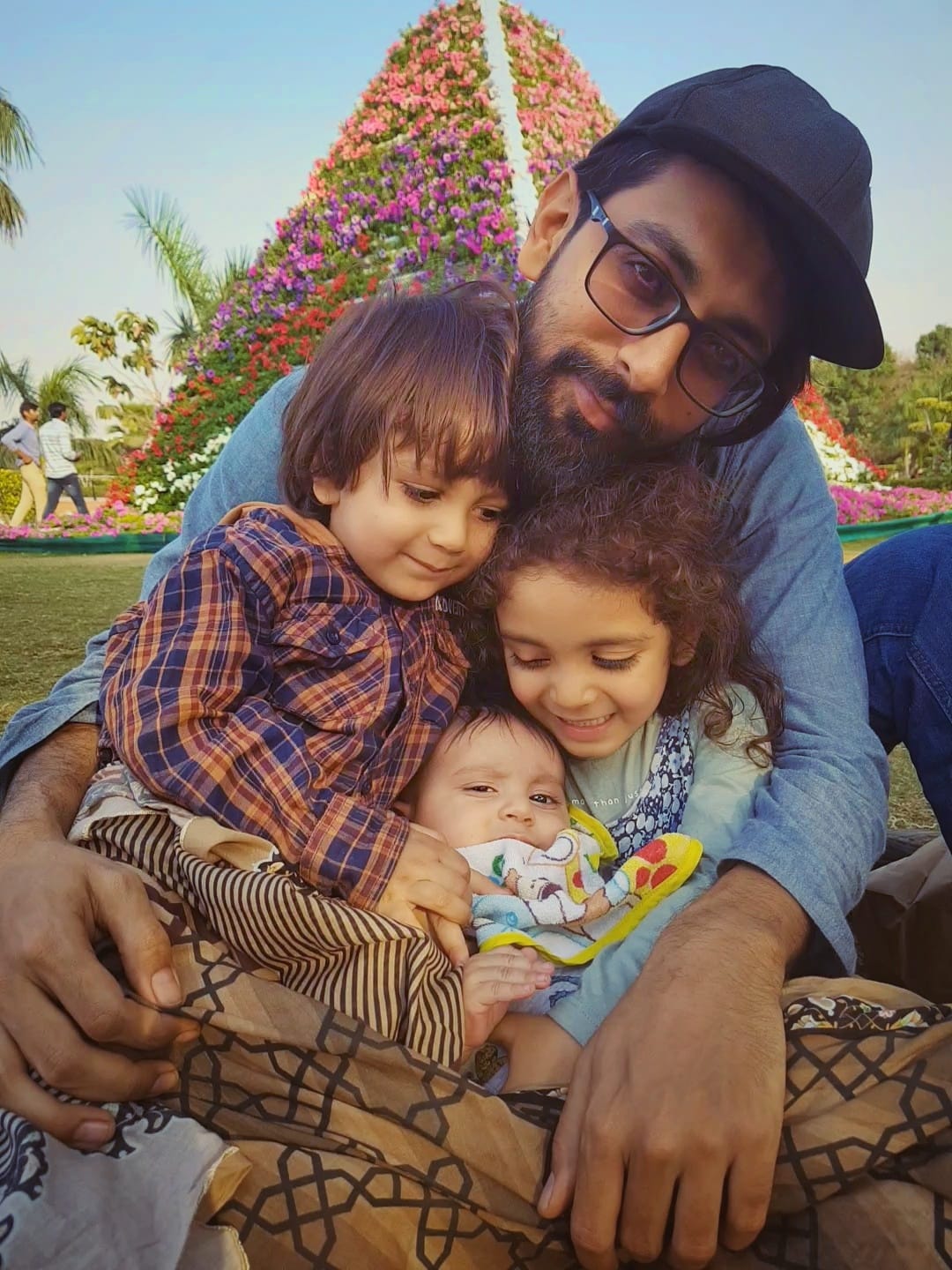🌾 Dr. Debal Deb & the Vrihi Folk Rice Seed Bank
📸 Authentic Glimpses of a Seed Guardian
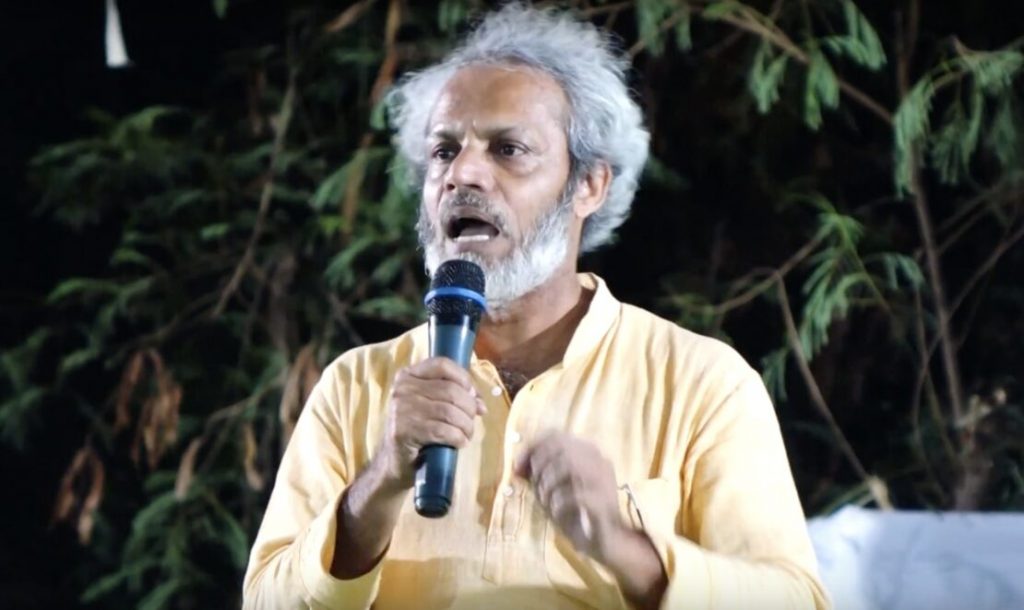
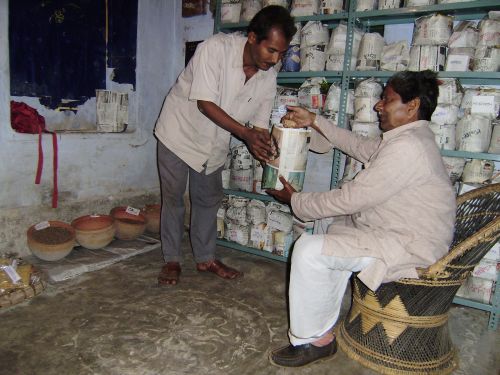
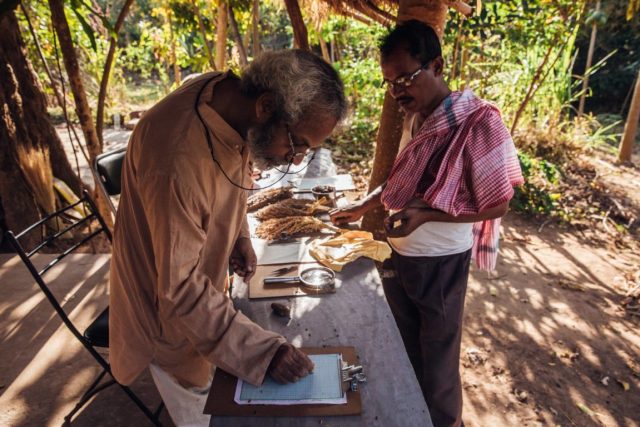
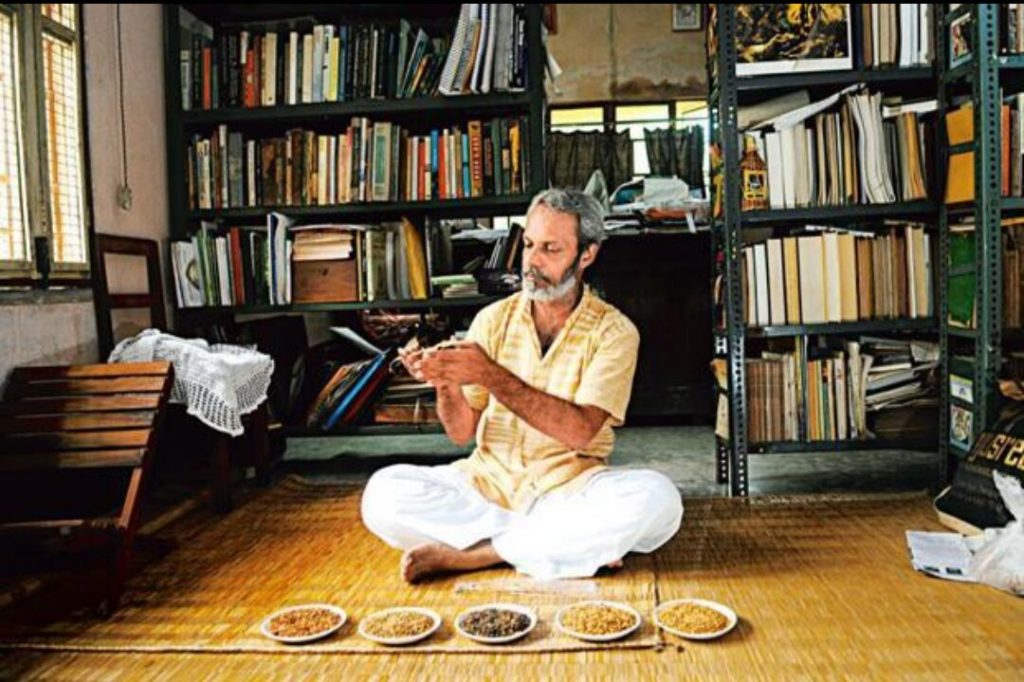
📍 About Vrihi & Its Founder
Vrihi (meaning “rice” in Sanskrit) is South Asia’s first non-governmental folk rice seed bank, founded in 1997 by Dr. Debal Deb in West Bengal.
Working independently—often under challenging conditions—Dr. Deb built Vrihi as an open-access seed repository, where farmers exchange indigenous rice varieties entirely free of charge, preserving priceless genetic heritage.
Growth & Impact
- Started with just a handful of varieties.
- Today: 1,400+ traditional landraces.
- Benefits tens of thousands of farmers through in-situ cultivation and seed sharing.
🌱 Basudha: The Living Conservation Farm
To complement Vrihi, Dr. Deb established Basudha, a model ecological farm where:
- Over 1,000 heirloom rice varieties are cultivated.
- Innovative agroecological methods—like staggered planting—are used to avoid cross-pollination.
- Farmers are trained in sustainable, chemical-free agriculture.
- Cultural and ecological knowledge is preserved alongside seeds.
💡 Why Vrihi Matters
1️⃣ Genetic Heritage
Vrihi conserves rare rice traits like:
- Flood & salt tolerance
- Natural aroma & nutrient richness
- Unique grain forms (double/triple-grained)
2️⃣ Climate Resilience
Traditional landraces help farmers recover after:
- Flood surges
- Soil salinization
- Climate-related crop failures (e.g., in the Sundarbans)
3️⃣ Community Empowerment
- Revives seed-sharing traditions
- Strengthens farmer self-reliance
- Supports sustainable livelihoods rooted in local biodiversity
🌾 Legacy of a Seed Warrior
For Dr. Debal Deb, seed conservation is not just about biodiversity—it’s about:
- Reviving cultural traditions
- Defending ecological justice
- Passing ancestral farming wisdom to future generations
Vrihi’s work stands as a living reminder that the future of food lies in the seeds of our past.
🌾 Guardians of the Grain: Dr. Debal Deb, Vrihi, and the Living Legacy of Basudha
📖 A Vision Rooted in the Soil
In an era where industrial agriculture narrows crop diversity to a handful of high-yield hybrids, Dr. Debal Deb stands as a rare custodian of India’s agricultural heritage. Scientist, ecologist, and often called the barefoot conservator, Dr. Deb has dedicated his life to safeguarding indigenous rice varieties and restoring farmer autonomy.
His journey began in 1997 with the founding of Vrihi—Sanskrit for “rice”—India’s first non-governmental folk rice seed bank. Built entirely on trust and farmer-to-farmer exchange, Vrihi now houses over 1,400 traditional rice landraces, many rescued from near extinction. The seed bank operates with a simple, revolutionary rule: no money, no patents—just sharing.
🌱 Vrihi: The Seed Bank That Shares Life
📍 How It Works
- Farmers receive seeds free of charge from Vrihi.
- They are encouraged to grow the crop and return an equivalent quantity of seeds the following year.
- This cycle ensures continuous cultivation, preventing genetic erosion and adapting seeds to evolving climate and pest pressures.
🧬 Why These Seeds Matter
The rice varieties in Vrihi carry traits long bred out of commercial hybrids:
- Flood resistance
- Salt tolerance
- Exceptional aroma
- Micronutrient richness
- Rare multi-grain panicles
These traits are not just botanical curiosities—they are lifelines for farmers facing floods in the Sundarbans, saline intrusion in coastal Odisha, and erratic rains in central India.
🏞 Basudha: A Living Laboratory for Biodiversity & Sustainability
To deepen his conservation work, Dr. Deb founded Basudha—a 1.7-acre conservation farm in Odisha that doubles as a training center and experimental agroecology hub. Here, ancient farming wisdom meets meticulous scientific practice.
1️⃣ Living Seed Bank with Flowering Asynchrony
- Over 1,000 indigenous rice varieties are cultivated annually.
- Planting schedules are arranged so that no two neighboring varieties flower at the same time, preventing cross-pollination.
2️⃣ Precise Characterization & Purity Maintenance
- Each variety is evaluated on 56 morphological traits—from leaf angle to grain length—to ensure genetic fidelity.
- Typically 64 plants per variety are grown in a small plot, with “off-type” plants removed.
3️⃣ Seed Exchange Based on Cultivation
- Farmers receive seeds with the commitment to grow and return them the next year.
- This ensures adaptation to changing climatic and ecological conditions.
4️⃣ Agroecology Training & Ecological Architecture
- Annual workshops teach: composting, mulching, cover cropping, multiple cropping, seed documentation, and pollination control.
- Infrastructure is built from adobe, lime, and thatch—no cement, kiln bricks, or timber—and powered entirely by solar energy.
- EcoSan dry toilets recycle nutrients back into the soil.
📊 Summary Table
| Component | Key Feature |
|---|---|
| Seed Conservation | Annual cultivation of hundreds of heirloom varieties using flowering asynchrony |
| Genetic Purity | Morphological assessments & rogueing ensure true-to-type propagation |
| Seed Exchange | Farmers receive, cultivate, and return seeds—nurturing resilience & community |
| Sustainable Practices | Agroecological training, composting, ecological architecture demonstrations |
🌍 Why This Work Matters
🌾 Genetic Heritage
Every seed in Vrihi is a piece of history—holding climate-resilient traits and cultural stories passed down for centuries.
🌦 Resilience to Climate Shocks
In flood-prone and salt-affected areas, Vrihi varieties have helped farming communities recover without depending on costly external inputs.
👩🌾 Farmer Autonomy
Seed exchange rebuilds local seed sovereignty, freeing farmers from corporate seed dependence.
📌 How You Can Support or Learn from Vrihi & Basudha
- Farmers: Contact Vrihi or Basudha to request seeds under their cultivation-return model.
- Researchers & Students: Attend Basudha’s agroecology training programs.
- Communities: Start a local seed bank or library using Vrihi’s open-exchange principles.
📬 Contact Details
Vrihi Seed Bank & Basudha Conservation Farm
📍 Location: West Bengal (Vrihi) & Odisha (Basudha), India
🌐 Website: (We can insert if you want)
📧 Email: (Insert verified email from Dr. Deb’s contact point)
📞 Phone: (Insert direct line if available)
✨
Dr. Debal Deb’s work is not just about seeds—it is about restoring the deep relationship between people, plants, and place. In each grain lies a story, a survival strategy, and a promise for the future. By protecting these seeds, we protect not just biodiversity, but cultural memory and the resilience of our food systems.
🌾
📦 Practical Resource Box: Seed Banks & Libraries You Can Contact
Below is a curated list of active indigenous and heirloom seed repositories—including Dr. Debal Deb’s initiatives—where individuals can access seeds, learn seed-saving techniques, and start community seed banks in their own regions.
1. Vrihi Folk Rice Seed Bank 🌾
Focus: Over 1,400 indigenous rice varieties from across India
📍 Location: Bankura, West Bengal, India
📧 Email: (Available via Basudha network or direct request)
🌐 Info: Vrihi Seed Bank overview
📌 Model: Free seed exchange—return same quantity next year after cultivation
2. Basudha Conservation Farm 🌱
Focus: In-situ conservation of 1,000+ heirloom rice varieties; agroecology training
📍 Location: Rayagada district, Odisha, India
📧 Email: (Same as Vrihi’s—private to protect against spam, given on request)
🌐 Info: Basudha Profile
📌 Model: Training + seed distribution for cultivation-return cycle
3. Navdanya Biodiversity Farm 🌻
Focus: 150+ crops; seed sovereignty and organic farming training
📍 Location: Doon Valley, Uttarakhand, India
📧 Email: info@navdanya.net
🌐 Website: www.navdanya.org
📌 Model: Farmer training programs + seed exchange for organic communities
4. Auroville Seed Bank 🌼
Focus: Indigenous vegetables, medicinal plants, grains
📍 Location: Auroville, Tamil Nadu, India
📧 Email: seeds@auroville.org.in
🌐 Website: Auroville Seed Bank
📌 Model: Seeds available for exchange/donation; public workshops
5. Seed Savers Exchange 🌽
Focus: Preservation of 20,000+ rare vegetable, herb, and flower varieties
📍 Location: Decorah, Iowa, USA
📧 Email: seedsavers@seedsavers.org
🌐 Website: www.seedsavers.org
📌 Model: Membership-based seed exchange; global shipping of non-restricted species
6. The Millennium Seed Bank (Royal Botanic Gardens, Kew) 🌍
Focus: Global wild plant species conservation
📍 Location: Wakehurst, West Sussex, UK
📧 Email: msb@kew.org
🌐 Website: www.kew.org/science/our-science/projects/millennium-seed-bank
📌 Model: Research, conservation partnerships, and seed storage—less farmer exchange, more biodiversity protection
7. Australian Seed Bank Partnership 🌏
Focus: Native Australian plant conservation
📍 Location: Australia-wide (network)
📧 Email: seedpartnership@anbg.gov.au
🌐 Website: www.seedpartnership.org.au
📌 Model: Collaboration with Indigenous communities, public contributions welcome
8. African Biodiversity Network – Seed Sovereignty Program 🌿
Focus: Indigenous seeds & agroecology in Africa
📍 Location: Regional network (Kenya, Ghana, Ethiopia, etc.)
📧 Email: info@africanbiodiversity.org
🌐 Website: www.africanbiodiversity.org
📌 Model: Community seed banks, training, and farmer exchanges
🛠 Starting Your Own Seed Bank or Library: Quick Guide
- Gather Indigenous Varieties – Reach out to seed banks above; focus on varieties adapted to your local climate.
- Set Exchange Rules – Require borrowers to return the same amount of seed after cultivation.
- Train Your Community – Host workshops on seed saving, pollination control, and soil health.
- Document Everything – Record variety names, traits, origin stories, and growing conditions.
- Store Seeds Properly – Use airtight containers, label clearly, and store in a cool, dry place.
- Network – Connect with other seed banks for diversity and resilience.
✨
By tapping into these seed networks—and following in the footsteps of visionaries like Dr. Debal Deb—anyone can become a guardian of biodiversity. In doing so, you’re not just planting crops—you’re planting resilience, culture, and hope for the generations to come.

